Figure 7. Model.
Rp/+ genotypes express a phenotype of reduced translation, slow cellular growth rate, and reduced competitiveness in comparison to wild type cells. All of these effects of the Rp+/− genotypes depended on the bZip-domain protein Xrp1. The signal to induce Xrp1 transcription depended on the RpS12 protein, which appeared to signal the existence of a ribosomal defect or ribosomal protein imbalance(Kale et al., 2018). Xrp1 was responsible for reducing the bulk translation rate in Rp+/− cells, and this must include a reduction in the translational activity of mature ribosomes. Reduced translation was likely responsible for the slow growth of Rp+/− cells, although Xrp1 might also affect growth independently of translation. Xrp1 also controlled the competitiveness of Rp+/− cells in mosaics with wild type cells, which provides a possibility for eliminating Rp+/− cells in favor of non-mutant replacements. We hypothesize that one or more target genes control competitiveness, either in response to Xrp1 itself, or indirectly in response to the changes in translation or growth rates. By utilizing cell competition, a decision could be made to eliminate defective cells only where better cells were available to replace them.

